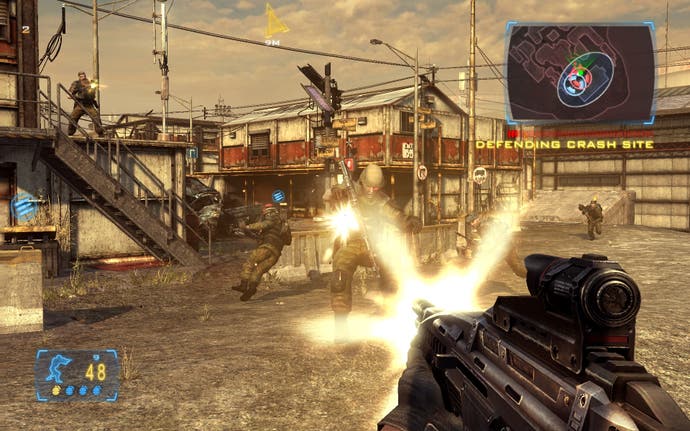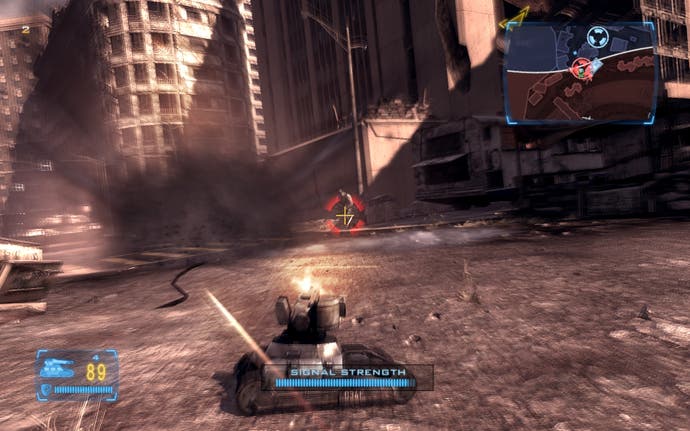Frontlines: Fuel of War
Turmoil. By Kaos.
The future used to be a great place to be. Back in the absurdly optimistic late '70s and early '80s, we were all looking forward to a 21st Century world including universal spandex acceptance, teleportation devices, little laughing robot slaves that mashed potatoes for you, video phones and hover boards. Well, we got the video phones (happy slappers rejoice!), but the silver clothes never caught on, and the rest was a big fat lie designed to keep kids watching Tomorrow's World. Was everything about our childhood a fib?
Today's version of the future is more honest, therefore an unending stream of doom. If the media's not furrowing its brow over climate change, nuclear programs, house prices or religious extremism, then there's always rocketing fuel prices and the dwindling oil reserves to max out the misery-o-meter. Now, let's fast forward to the year 2024, and imagine how bad things are going to get.
17 years on from these relatively utopian times, Frontlines: Fuel of War paints a distinctly bleak picture of a world scrapping furiously to get hold of the remaining energy reserves. In 2012, the world goes into an economic depression known as 'The long emergency': blackouts last weeks, Africa runs out of food and political divisions run deep. But, far from things getting better with the advancement of renewable energy sources, the obsession with fossil fuel goes on. The Russians team up with the Chinese and form the Red Star Alliance, and have designs on the big untapped oil stocks under Taiwan. This, of course, doesn't go down well with the Western Coalition, (comprised of the United States and the European Union) and the situation soon escalates into all-out war over who controls these increasingly valuable resources.
Another throw of the DICE

Cue Unreal Engine 3-powered first-person shooter action, from the makers of the highly regarded Battlefield 1942 mod Desert Combat. In case you've missed the New York studio's merry-go-round name-change comedy, here's the deal: Trauma Studios was brought into the DICE fold in 2004, and the following year was shut down. From the ashes, THQ hired the newly renamed Kaos Studios to develop what was to become a multi-platform shooter on PC, 360 and PS3. Almost two years on, the fruits of its labours are ready to show off, and we're given a quick hands-on with the multiplayer, and a more detailed assessment of the single-player campaign.
The first thing to note is how completely different the single and multiplayer modes feel to play. Despite the evident similarities to the revered Battlefield series in the online multiplayer mode, the fully-fledged campaign mode offers an entirely different experience. While multiplayer is much more of a 'combat sandbox' where you take on different roles and engage in a tug o' war with the opposition over who controls the 'frontline', the single-player equivalent has a much more defined objective-based approach to the concept of moving forward that frontline. In many ways it's not dissimilar to the freedom exploited in Medal of Honor: Airborne, and that's definitely a good thing.
Essentially, the vibe the team wanted for the single-player was to somehow capture the kind of cinematic intensity of the Call of Duty games, but without that linear stranglehold which shapes every decision. In Frontlines, you can expect a bunch of key goals, and multiple ways of approaching them - not to mention the freedom to tackle them in the order of your choosing. Okay, so this has been done before in other games, but what's interesting about Frontlines is not only do the enemy fight back and reclaim territory, but that you can approach the war in a refreshing variety of ways.
Droning on

By far the most interesting way of taking the fight to your enemy is via a variety of high tech drones such as RC cars and choppers, which give you the opportunity to surprise the enemy with fast-moving and nimble attack vehicles that can fly or drive right into their midst before they have time to react. Packed with C4, the RC drone provides the ultimate suicide bombs, allowing you to swiftly drive under tanks and other armoured vehicles and blow them sky high with minimal danger to you and your men. Again, the RC chopper gives you the opportunity to surprise the enemy by flying right into their midst and pick off key targets before they can react. Elsewhere, the Gatling gun-mounted Assault drove and the Mortar drone present you with a massive opportunity to take down key buildings and entrenched enemies. Albeit limited by a specific range, this hands-off approach gives Frontlines an interesting tactical point of difference that also benefits the overall gameplay variety on offer.
Alternatively, of course, you can ignore all that and simply charge in all-guns-blazing in a more traditional fashion, or grab a nearby vehicle and make use of its mounted cannon or grenade launcher to take on the armoured vehicles giving you grief. The fact that there's no right or wrong approach and no set scripted path through each level is much appreciated, and helps give players an unusual degree of freedom without sacrificing the overall impression of a raging battle. To witness enemies taking advantage of weaknesses and re-taking captured points is also a sign of a developer taking steps to lend that sense of dogged determination that so few games infuse into the enemy AI.


